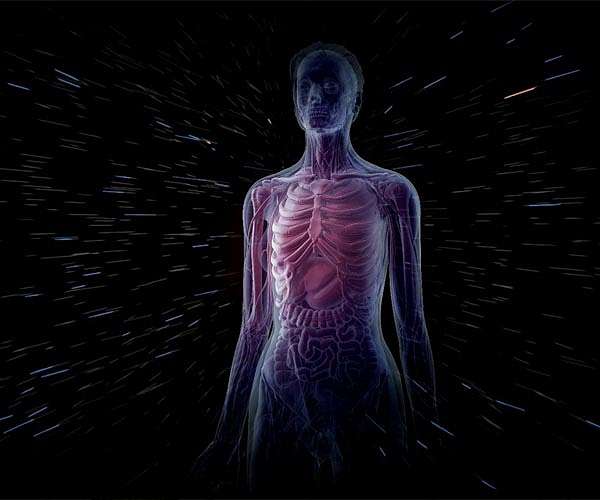Optimizing Human Health On Earth And In Space
by Caitlin Clark for TAMU News
College Station TX (SPX) May 28, 2025
The health challenges astronauts face in the spaceflight environment are numerous. There are the effects of microgravity, exposure to space radiation and mental health struggles that come with long-duration missions, to name a few. And as humans prepare to venture deeper into space – with potential trips to the moon, Mars and beyond – there is still much to learn about the health implications for the astronauts on these voyages.
That’s why to Dr. Jeffery Chancellor, advancing human health and performance in space is the next frontier of the aerospace field. Chancellor, a physicist and space radiation expert who has worked on more than 10 NASA-funded flight studies, expects the discipline of aerospace medicine to grow exponentially over the next five to 10 years – making Texas A and M University a key player in setting the standard for space health education and research through the aerospace medicine program in the College of Medicine.
Chancellor, along with his wife, Dr. Serena Aunon-Chancellor – a physician with 15 years of experience as an astronaut – joined Texas A and M in September as an associate professor in the College of Medicine. He was recently named director of the program, which was created in 2023 to look at the risks considered the most critical to spaceflight and develop countermeasures that contribute to safer space exploration.
“As a space-grant university that has made significant contributions to NASA-led research, Texas A and M is uniquely positioned to lead the future of aerospace medicine,” said Dr. Amy Waer, dean of the College of Medicine. “We are pioneering research and training programs that are critical to ensuring the health of astronauts while connecting with industry and national and global leadership across the aerospace domain.”
Mitigating Spaceflight’s Effects On Astronauts
Spending prolonged periods in space comes with a number of health risks.
Without gravity, the weightless environment can affect astronauts’ bone health. The change in pressure shifts fluid in the human body, potentially causing significant changes to the cardiovascular system. And crew members who fly to Mars for six to eight months in what Chancellor describes as “a tin can the size of a large closet” will undoubtedly experience changes to their behavioral and mental health.
Texas A and M researchers are studying all of the above, Chancellor said, in addition to the limitations to certain medical capabilities in space, like being able to fill a syringe, inject a patient with medication or draw blood in zero gravity.
For Chancellor, the opportunity to lead the program has brought him back to the place where he became interested in the effects of exposure to space radiation – one of the most significant challenges of space exploration – as a Ph.D. student. His research focuses on modeling and mitigating the radiation risks that astronauts face, the effects of which are still largely unknown.
Exposure to space radiation could significantly impact cardiovascular health, cause cognitive deficits and even result in cancer, Chancellor said. But since the beginning of the spaceflight program, there have been no documented health outcomes in crew members that have been attributed to space radiation exposure. The risk assumptions are based on outcomes on Earth, such as those observed in people who survived atomic bombs or occupational incidents like the Chernobyl disaster.
Better understanding the effects of whole-body radiation exposure is critical to enabling longer missions, as career-long exposure thresholds for the total amount of space radiation astronauts can receive are a limiting factor to long-distance voyages, Chancellor said.
Research And Education
When it comes to researching how the space environment affects human health, Chancellor stresses the importance of a multidisciplinary approach.
“It can’t be just a physician, it can’t be a biologist, microbiologist, geneticist or behavioral specialist,” he said. “It has to be a team working together to understand how the stress affects the various aspects of the machine, the human body and the overall outcome.”
Training future aerospace physicians is also a focus of the program.
Starting this summer, a distinction track will be available to a select number of first- and second-year medical students that provide hands-on experience in the clinical and operational aspects of aerospace medicine. Students will hear lectures from experts in the discipline, including astronauts, crew medical officers and flight directors, in addition to conducting 100 hours of research alongside faculty members. They’ll also do rotations at commercial spaceflight companies, shadowing medical personnel for preflight briefings, launches and landings.
“I want it to be the example of what a good aerospace program should be,” Chancellor said. “There isn’t anything very much like what we’re doing right now. We’re focusing not only on training post-graduate physicians in aerospace medicine but also doing research that supports NASA’s mission, the Department of Defense and the commercial space mission of putting humans in space. We’re trying to tackle it on all fronts, including training and workforce development.”
Related Links
Texas A and M University
Space Medicine Technology and Systems

